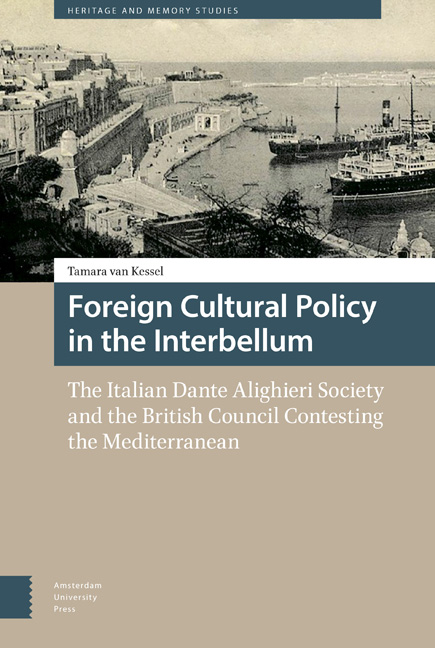 Foreign Cultural Policy in the Interbellum
Foreign Cultural Policy in the Interbellum Book contents
- Frontmatter
- Contents
- List of Illustrations
- Introduction
- 1 The Development of Foreign Cultural Policy
- 2 The Dante Alighieri Society and the British Council: Agency and Independence
- 3 Constructions of ‘Italianità’ and ‘Britishness’
- 4 The Battle for Cultural Hegemony in Malta
- 5 National Culture and Imperial Conquest: The Dante Alighieri Society in Abyssinia and the British Council in Egypt
- Conclusion
- Acknowledgements
- Bibliography
- Index
4 - The Battle for Cultural Hegemony in Malta
Published online by Cambridge University Press: 12 February 2021
- Frontmatter
- Contents
- List of Illustrations
- Introduction
- 1 The Development of Foreign Cultural Policy
- 2 The Dante Alighieri Society and the British Council: Agency and Independence
- 3 Constructions of ‘Italianità’ and ‘Britishness’
- 4 The Battle for Cultural Hegemony in Malta
- 5 National Culture and Imperial Conquest: The Dante Alighieri Society in Abyssinia and the British Council in Egypt
- Conclusion
- Acknowledgements
- Bibliography
- Index
Summary
Malta played an emblematic role in the Italo-British battle for cultural dominance in the Mediterranean. This chapter sheds light on the close involvement of the Dante Alighieri Society and the British Council in claiming the island's allegiance through culture and especially language. Malta had been part of the British Empire since 1815. From the early 1920s, the British government tried to suppress Italian nationalists who were demanding more independence. Lord Gerald Strickland, the leader of the pro-British Constitutional Party and prime minister of Malta between 1927 and 1932, was the embodiment of this hard-line policy. In 1932, the use of the Italian language at Maltese primary schools was banned, and in 1934 Italian was even excluded as an official language in public administration and legislation. While Italy was reclaiming the Mediterranean as its Mare Nostrum and strengthening its ties with the Italophile Maltese, Strickland sought to demonstrate that the Maltese were descendants of a Phoenician colony and that, through the Phoenician presence in Scotland, Ireland, Wales, and Cornwall, the Maltese were in fact closer to the British than to the Latin people. The Dante Alighieri Society condemned the British policy, protesting through its publications against the unjust treatment of its Italian-speaking brothers. In the meantime, the British Council established a British Institute, opened in 1939, with which it could help strengthen the position of British culture on the island. Without doubt, cultural policy played an important role in the Italian and British interwar strategy with regards to this pivotal place in the Mediterranean Sea.
Malta: a chess piece in the Mediterranean
Over the centuries, the island of Malta experienced various shifts in power because of its strategic position in the Mediterranean Sea. After having been part of the Roman Empire and then the Byzantine Empire, at the beginning of the twelfth century Malta was incorporated into the Normanruled Kingdom of Sicily. Subsequently it came into the hands of the Aragon family, whose descendant Charles V gave Malta in 1530 in feudal tenure to the Military Order of the Knights of St John of Jerusalem, known also as the Knights Hospitaller. These knights had fled from their former base, Rhodes, after being defeated by the Ottoman Empire. A miniature, harmonious Europe developed in Malta as Knights of the Order's eight Langues, or Tongues, settled there.
- Type
- Chapter
- Information
- Foreign Cultural Policy in the InterbellumThe Italian Dante Alighieri Society and the British Council Contesting the Mediterranean, pp. 141 - 176Publisher: Amsterdam University PressPrint publication year: 2016


